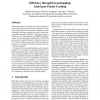Free Online Productivity Tools
i2Speak
i2Symbol
i2OCR
iTex2Img
iWeb2Print
iWeb2Shot
i2Type
iPdf2Split
iPdf2Merge
i2Bopomofo
i2Arabic
i2Style
i2Image
i2PDF
iLatex2Rtf
Sci2ools
118
Voted
NSDI
2008
2008
Efficiency Through Eavesdropping: Link-layer Packet Caching
The broadcast nature of wireless networks is the source of both their utility and much of their complexity. To turn what would otherwise be unwanted interference into an advantage, this paper examines an entirely backwardscompatible extension to the 802.11 link-layer protocol for making use of overheard packets, called RTS-id. RTS-id operates by augmenting the standard 802.11 RTS/CTS process with a packet ID check, so that if the receiver of an RTS message has already received the packet in question, it can inform the sender and bypass the data transmission entirely. We present the design, implementation, and evaluation of RTS-id on a real hardware platform that provides a DSP-programmable 802.11 radio. While limited in scale due to restricted availability of the CalRadio platform, our testbed experiments demonstrate that RTS-id can reduce air time usage by 25.2% in simple 802.11b infrastructure deployments on real hardware, even when taking into account all of the protocol overhead. ...
Related Content
| Added | 02 Oct 2010 |
| Updated | 02 Oct 2010 |
| Type | Conference |
| Year | 2008 |
| Where | NSDI |
| Authors | Mikhail Afanasyev, David G. Andersen, Alex C. Snoeren |
Comments (0)

